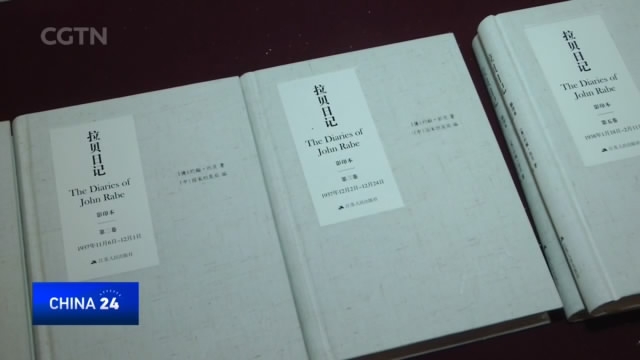
21:33, 12-Dec-2017
Nanjing Massacre: The Diaries of John Rabe: An important historical record of the Nanjing massacre

During world war two, he was called the good German in Nanjing. Meet John Rabe, one of the most well-known Germans in China. The Diaries of John Rabe provide evidence and details of what the invading Japanese Military DID during the 1937 Nanjing massacre. Now, the photocopies of The Diaries of John Rabe as well as the Documents of the Nanjing Massacre have been published in Nanjing. Let's take a look.
The State Archives Administration of China received the complete photocopied version of the The Diaries of John Rabe thanks to the manuscript donated by John Rabe's grandson, Thomas Rabe. There are more than 2000 pages, without any abridged. It is regarded as the most important and the best preserved historical record to study the Nanjing massacre.
THOMAS RABE GRANDSON OF JOHN RABE It was a good idea to send the original manuscript of The Diaries of John Rabe to China. Only people who experienced this part of the history can really understand it. Only by giving these historical records to China, can this part of history be better understood.
Japanese troops captured Nanjing on December 13th, 1937. Over the course of six weeks, they killed 300-thousand Chinese civilians and soldiers.
In those dark times, many foreign businessmen and missionaries chose to stay in Nanjing. Among them was John Rabe from Hamburg. They created the International Committee for the Nanjing Safety Zone to help Chinese people escape the massacre.
John Rabe wrote in his diary that The 27 Westerners who stayed on in Nanjing and the Chinese were shocked by the scale of the robbery, rape and murder by Japanese soldiers.
WANG HONGMIN THE STATE ARCHIVE ADMINISTRATION OF CHINA The Diaries of John Rabe is an important supplement of the existing historical archives. It is a real historical record, and is also an international third party record.
Documents of the Nanjing Massacre were listed on the UNESCO Memory of the World Register in 2015. The historical records provide a powerful refutation of the Japanese right-wing denial of the Nanjing massacre.

SITEMAP
Copyright © 2018 CGTN. Beijing ICP prepared NO.16065310-3
Copyright © 2018 CGTN. Beijing ICP prepared NO.16065310-3